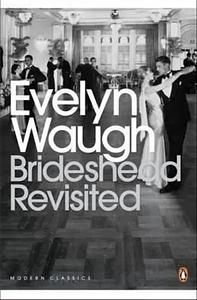You need to sign in or sign up before continuing.
Take a photo of a barcode or cover
challenging
reflective
sad
slow-paced
Upon first read I thought Brideshead Revisited was an almost perfect novel and that impression is justified by much in the novel - Sebastian and Charles' tenderly drawn relationship, Cordelia's childish intelligence, the sublime beauty of Waugh's Oxford descriptions and the architectural intensity with which the novel is constructed.
Upon new readings, however, much of the glamour seems to slightly fade away. Julia is a feeble example of a female character (one of Waugh's worst and that is saying something) with her actions seeminly informed by no feelings at all and there is a lot of telling the reader that she is extremely captivating and interesting but not a lot of showing it. Lady Marchmain too feels flat - Waugh himself seems unsure about how he wants the reader to feel about her. Waugh's theology clearly underpins the novel and this comes across on some occassions as slightly heavy handed - the constant twitches upon an invisible thread, for example.
Crucially, the book dulls once Ryder leaves Oxford. This might be intentional on behalf of the author but it doesn't undermine the slight let-down that the rest of the novel feels - something that seems at odds with the story of spiritual discovery that Waugh is trying to present. The sublime beauty of Waugh's Oxford descriptions is never recovered, in fact the language by the end of the novel tries and fails to attain the lyrical quality of the beginning - Lord Marchmain's deathbed speech is the best example of this failure.
However, for all its flaws, Brideshead is still a hugely enjoyable book and the fact that I cannot quite be sure whether any of my criticisms might not have been intended by Evelyn Waugh just shows the sheer mastery that Waugh had over his writing. Not a perfect book but certainly a magical one.
Upon new readings, however, much of the glamour seems to slightly fade away. Julia is a feeble example of a female character (one of Waugh's worst and that is saying something) with her actions seeminly informed by no feelings at all and there is a lot of telling the reader that she is extremely captivating and interesting but not a lot of showing it. Lady Marchmain too feels flat - Waugh himself seems unsure about how he wants the reader to feel about her. Waugh's theology clearly underpins the novel and this comes across on some occassions as slightly heavy handed - the constant twitches upon an invisible thread, for example.
Crucially, the book dulls once Ryder leaves Oxford. This might be intentional on behalf of the author but it doesn't undermine the slight let-down that the rest of the novel feels - something that seems at odds with the story of spiritual discovery that Waugh is trying to present. The sublime beauty of Waugh's Oxford descriptions is never recovered, in fact the language by the end of the novel tries and fails to attain the lyrical quality of the beginning - Lord Marchmain's deathbed speech is the best example of this failure.
However, for all its flaws, Brideshead is still a hugely enjoyable book and the fact that I cannot quite be sure whether any of my criticisms might not have been intended by Evelyn Waugh just shows the sheer mastery that Waugh had over his writing. Not a perfect book but certainly a magical one.
I read BH a long time ago, and wasn't particularly interested/impressed, but tastes change and it was the book chosen for the library's Brit Lit Book Club. But again, meh. Waugh certainly had the ability to craft an observation beautifully, but all depiction of emotion, especially anything to do with affection, is so brittle or so clumsy that it is impossible to believe the first-person narrative--it sounds instead like a don writing a biography of an obscure figure from a long-vanished culture. Dropping the most interesting character out of the narrative less than halfway through, and reviving him only occasionally in short status updates, makes the last half much more of a slog. I think this is one of the few cases in which the adaptation is a lot better than the original work.
challenging
dark
sad
tense
slow-paced
Plot or Character Driven:
Character
Strong character development:
No
Loveable characters:
No
Diverse cast of characters:
N/A
Flaws of characters a main focus:
Yes
emotional
reflective
sad
tense
slow-paced
Plot or Character Driven:
A mix
Strong character development:
Yes
Loveable characters:
Complicated
Diverse cast of characters:
No
Flaws of characters a main focus:
Yes
⭐️⭐️ Two stars solely because I stuck it out until the end. Dear gods, was this an interminable slog. The only redeeming quality was Jeremy Irons’ narration.
11 1/2 hours of variations on, “Woe is me. I’m wealthy and privileged, and no one understands me and my life is so hard. Woe!” 🙄
11 1/2 hours of variations on, “Woe is me. I’m wealthy and privileged, and no one understands me and my life is so hard. Woe!” 🙄
emotional
reflective
slow-paced
Plot or Character Driven:
Character
Strong character development:
Yes
Loveable characters:
Complicated
Diverse cast of characters:
No
Flaws of characters a main focus:
Yes
“i feel the past and the future pressing so hard on either side that there’s no room for the present at all.” …. real
I needed more Sebastian, but in his absence, Julia somehow sufficed.





